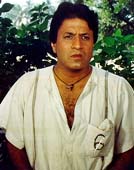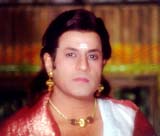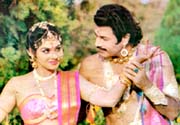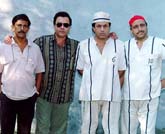Syed Firdaus Ashraf
 "In this world, if you want to achieve something, then you
have to pay a price for it!"
"In this world, if you want to achieve something, then you
have to pay a price for it!"
It could be a straight lift from the Indian scriptures - but isn't.
Rather, that piece of wisdom comes from the mouth of Arun Govil,
the man who, after a more or less indifferent film career, shot
to national icon-dom in the role of Ram, prince of Ayodhya and
protagonist of the Hindu epic Ramayan, which was parlayed
by Ramanand Sagar into one of the most watched serials in Indian
television history.
That first success in playing a godly role has, since, caused
Govil to shift almost entirely to playing various godly characters,
on both the big and small screens. And today, under the direction
of C S Rao, Govil is busy portraying Gautama Buddha, for
an upcoming teleserial on the subject.
Excerpts, from an exclusive interview with Rediff On The NeT:
Could you quickly take us through your early career, tell us
how you entered films?
I graduated in science from Meerut in Uttar Pradesh, then came
to Bombay to join my brother's business. But that bored me and,
since I had been active in theatre while I was in college, I decided
to try my hand at acting. I got my first break, way back in 1977,
when Rajshree Pictures signed me on for a film called Paheli.
It was a small role, but my performance was liked and that
exposure led to three lead roles, in Sawan Ko Aane Do, Sanjh
Ko Aanch Nahin and Radha aur Sita. The first of these
three films, incidentally, became a big hit.
And how did the shift to the small screen come about?
I was doing a film called Badal for Ramanand Sagar's banner,
under Anand Sagar's direction, and around this time they offered
me the role of King Vikram for the teleserial Vikram aur Vetaal.
 Around this time the Sagars were planning to serialise Ramayan (right),
so I approached Mr Ramanand Sagar and said I was interested
in playing the lead role.
Around this time the Sagars were planning to serialise Ramayan (right),
so I approached Mr Ramanand Sagar and said I was interested
in playing the lead role.
After an initial audition, they offered me the roles of either
Bharat or Lakshman, but I refused. Somehow, I was set on playing
Ram, or nothing. I don't know what happened behind the scenes,
but in the end they offered me the lead role, and that was that.
And this is also one reason why I believe in predestiny, in fate.
And how was it like, playing perhaps the most popular deity
in the Hindu pantheon?
I would say it was perhaps the most difficult role I have ever
done. The main problem is that you can't take too many liberties
with the character. For instance, the Ram of the epic is a soft-spoken
person, not given to temper tantrums, the sort of person whose
movements would be controlled, never fast or jerky. So I had,
at all times, to portray the character in keeping with that serenity
-- and that is very difficult to do.
I guess the question of whether or not I succeeded is best answered
by an episode in Varanasi. For a shoot, I was dressed in Ram's
attire, and sitting in a boat on the river bank. People began
thronging to the venue by the hundreds - and the next morning,
it was reported in the papers that over one million people had
gathered at the site to see me. That, I guess, is the ultimate
honour an actor can get in this country.
 And now you are doing Buddha (left) - another serene character. How
did you get this role?
And now you are doing Buddha (left) - another serene character. How
did you get this role?
Oh, I was offered this role long ago, when I was just starting
my career. At the time, the producers, who were from South India,
insisted I shave my head. I refused, as I was doing well in my
film career and couldn't afford to take the risk.
Recently, Padmalaya Studios, which is based in Hyderabad, signed
me on for Lakshman's role for the film Luv Kush.And
then offered me the role of Ram, again, for a serial titled Jai
Veer Hanuman. It was after this that they thought of making
a serial on the Buddha. They offered me the role, and I accepted.
You have worked in one mythological with the Sagars, now you
are working in another with C S Rao, the doyen of the genre in
India. How would you compare the two?
Ramanand Sagar is a good writer, and is always ready to
explain the minutest of details to the actors. As for Rao, Hindi
is not his language - he does speak it, and understands it, but
cannot go into finer details. So it is more difficult to understand
what he wants from you, grasp the nuances of your thinking.
And how would you compare the two characters, Ram and the Buddha?
Well, both had an identical goal - to establish Dharma, righteousness.
The difference, of course, was that Ram fought a war to attain
this goal, while Buddha used the path of non-violence.
Again, the Buddha did not come to this world with an immediate
knowledge of what his ultimate goal was - in his early years,
he enjoyed the life of a prince, indulging in all the worldly
temptations. Ram, however, knew from day one what his goal in
life is.
You have been portraying godly characters for a few years now,
are you in danger of being branded a screen 'god'?
In a sense yes - because after Ramayan, few people
were willing to touch me for feature films as they said my image
was too big. Their argument was, people would see me as Ram, my
posters were being worshipped, so how could I be shown chasing
some girl around trees in a typical Hindi film?
 After Ramayan ended in 1988, I went through this long hibernation,
when I wasn't getting any roles. In the end, I had to go into
business for myself, producing a teleserial - Mashaal -
for Doordarshan, then directing a Marathi serial for my wife.
Then, in a Zee TV serial called Karawas,(right) I played a criminal,
and my performance was accepted by the public.
After Ramayan ended in 1988, I went through this long hibernation,
when I wasn't getting any roles. In the end, I had to go into
business for myself, producing a teleserial - Mashaal -
for Doordarshan, then directing a Marathi serial for my wife.
Then, in a Zee TV serial called Karawas,(right) I played a criminal,
and my performance was accepted by the public.
I guess this is
what broke that branding, and now I have another serial coming
on DD, Aparajitha, in which I play a big writer who preaches
women's emancipation, but doesn't practise it in real life. I
guess I can now play other roles without fear of being rejected
by the audience, so I would say I am not 'branded' any longer.

